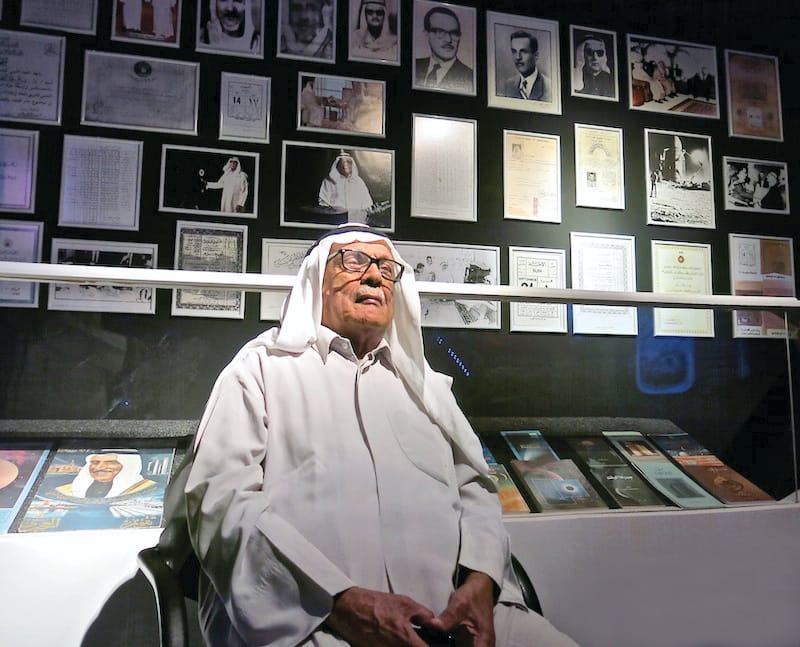By Ahmad Jabr
KUWAIT: Saleh Al-Ojairi, Kuwait's most prolific, well-known and highly regarded astronomer passed away yesterday. He was 101 years old. Ojairi leaves behind a legacy in science unmatched in Kuwait and the region with contributions in astronomy, meteorology, mathematics and other fields that served as a main source of knowledge and reference to generations of professionals and amateurs alike.
Ojairi is credited for introducing astronomy and meteorology to Kuwait, where he built the country's first observatory in the early 1970s. The Ojairi Calendar, first issued in 1952, is considered the most authentic and used calendar in Kuwait to follow dates and prayer times. He also has several publications, research papers and a library named after him. A beloved figure, Kuwait lost in Ojairi one of its pioneers and the man considered by many as the godfather of scientific research in Kuwait and the Gulf.
The beginnings
Born on June 23, 1920 in the Qibla neighborhood of Kuwait City, Ojairi received his primary education in kuttabs before moving to his father's school which was established in the late 1920s. Ojairi then enrolled in Kuwait's first public school; the Mubarakiya School where his genius became evident to teachers who noticed his great skills in mathematics that were way above average for his age. After graduation, he worked as a teacher in the Sharqiya and Ahmadiya schools, and one of his most famous students was the late Amir Sheikh Sabah Al-Ahmad Al-Jaber Al-Sabah.
Ojairi's love for astronomy started at a very young age. As a child, he used to get afraid of natural phenomena such as thunder and lightning. But his fear soon turned into curiosity when his family would explain to him how those events happened. After noticing his enthusiasm to learn, his father decided to send him to the desert where he stayed with a Bedouin tribe for a short time to learn their lifestyle as well as skills such as shooting and horse riding. There under the starry skies of the desert is where Ojairi's curiosity turned into a lifelong passion for astronomy.
At age 18, Ojairi had already become an avid reader when he found a book that would change his life forever: 'Al-Manaheg Al-Hamedia' by Egyptian writer and astronomer Ghaith Abdul Hamid Morsi. Enamored with the book, Ojairi decided to travel to Egypt and meet the author in person, and this was the first real step in his journey to knowledge. In Egypt, Ojairi also met famous astronomer Abdul Fattah Waheed who taught him the basics of astronomy. He then went to Cairo where he studied at the King Fuad University (modern day Cairo University) and earned a degree in astronomy. He later went to the Helwan Observatory, one of the oldest and most important in the Arab world, where he learned from renowned scholars including Abdul Hamid Samaha. Eventually, the Egyptian Association of Astronomy granted Ojairi a certificate in astronomy in appreciation for his publications and scientific research.
Passion for knowledge
Ojairi's journey did not come without adversity, which he overcame through passion, dedication, hard work and patience - his trademark drive that inspired generations. His travels had to wait until the end of World War II; and even then, transportation among countries was almost nonexistent. But he still chose to travel to Egypt fueled by an unending desire for knowledge.
In an interview with Kuwait Times published in 2015, Ojairi tells the story of how he made it to Cairo in order to meet his favorite writer. "I traveled to Egypt to meet the writer who made my brain explode with questions," he said. "At that time, we had no buses or planes, so I went to Egypt through land. I traveled from Kuwait to Basra, then to Beirut, Alexandria and finally to Cairo."
"I met the writer who welcomed me and taught me a lot, but he kept his valued books away from me and I was dying just to take them and read," Ojairi said, later explaining that he went back to his teacher's house after his death and his widow gave him the books as a gift.
Ojairi had several publications in astronomy throughout his illustrious career that remain of great value in libraries throughout the Arab world. In 1952, Ojairi released a calendar carrying his name, and Kuwait has since adopted it as the official calendar of the state. Many of the astronomy equipment and tools in Ojairi's observatory were brought by Ojairi himself from the US and UK on his own expense. Ojairi earned an honorary PhD from Kuwait University in 1981, and the Gulf Cooperation Council granted him its top honors in scientific research in 1988.
Ojairi's never-ending passion for knowledge and endless drive to learn more earned him the love, respect and appreciation of all in Kuwait where he is considered a national hero and a role model. Ojairi's name is synonymous with science in a country that is home to one of the Gulf's first universities: Kuwait University that was established in 1966. While his journey has inspired many in Kuwait and the Arab world to follow in his footsteps, his legacy will undoubtedly continue to inspire science lovers for generations to come.


